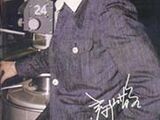Voice acting in Japan has far greater prominence than in most other countries. Japan's large animation industry produces 60% of the animated series in the world; as a result Japanese voice actors, or seiyū (声優), are able to achieve fame on a national level.
Besides acting as narrators and actors in radio plays, and performing voice-overs for non-Japanese movies and television programs, the seiyū are extensively employed as character actors in animes and video games. Popular seiyū, especially female ones such as Kikuko Inoue, Megumi Hayashibara, Aya Hirano, Aya Hisakawa, Mitsuki Saiga, Nana Mizuki, Paku Romi and Kugimiya Rie, often have devoted international fanclubs. Some fans may watch a show merely to hear a particular seiyū.[1]Some Japanese voice actors have capitalized on their fame to become singers,[2]and many others became live movie or television actors.
In Japan there are around one hundred and thirty voice-acting schools. Broadcast companies and talent agencies often have their own troupes of vocal actors. Magazines focusing specifically on seiyū are published in Japan, with Voice Animage being the most well known and longest running.
The English term character voice (or CV), has been commonly used since the 1980s by Japanese anime magazines such as Animec and Newtype, for a voice actor associated with a particular anime or game character. Conversely, the Japanese term seiyū is commonly used among English-speaking anime and game fans for Japanese voice actors.
Actors and seiyū[]
Initially, dubbing and doing voice-overs was a performance of an actor who used only his voice. When doing this job, they would be called "voice actors" (声の俳優, koe no haiyū?). For convenience, the term was shortened to a new compound consisting of the first and last kanji to make seiyū (声優?). It was only after the seiyū booms however that this word became widespread. For this reason, elderly voice actors resent being called seiyū, because during their time the term had a different (and minimizing) connotation. The renowned Chikao Ōtsuka, who dubbed Charles Bronson among others, was quoted in a special issue of Animage saying "We are actors. Even if a performance only requires the use of our voice, we still remain actors, and it is therefore incorrect to refer to us as just voice actors, isn't it?". He was opposed to the new trend of separating actors and seiyū, even in the face of emerging seiyū like Genzō Wakayama, who learned how to act using their voice and never set foot in a theater.
There are three main factors that set seiyū and actors apart.
- Their professional upbringing by the Tokyo Broadcasting Drama Troupe (東京放送劇団, Tōkyō Hōsō Gekidan?), formed by NHK and other private networks during the golden age of radio dramas.
- The increasing popularity of the television: due to the lack of Japan-made movies and dramas, TV networks were forced to air foreign shows, and that raised demand for seiyū.
- The boom in the anime world market, which produced a wave of young talents who wanted to become seiyū rather than actors.
All items (1)


